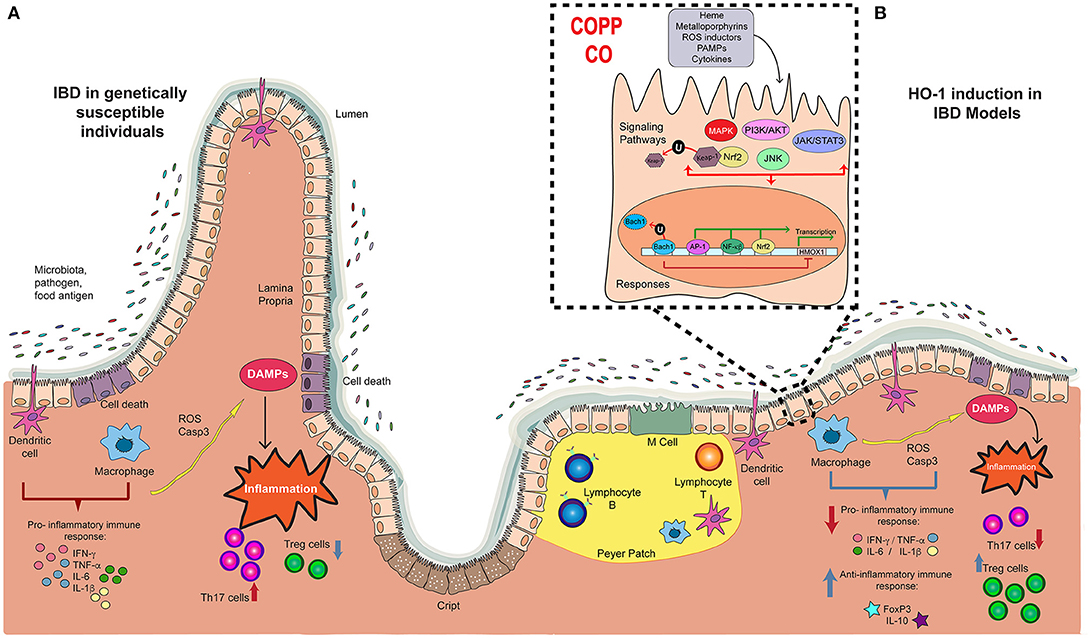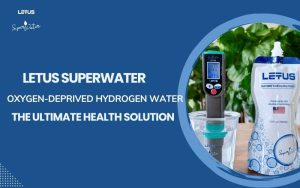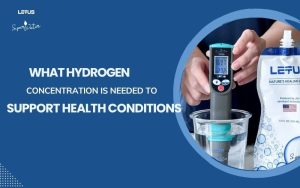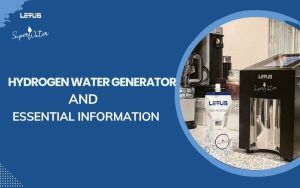Inflammatory Bowel Disease (IBD) is a group of chronic, relapsing, and remitting inflammatory conditions of the gastrointestinal tract, primarily comprising Crohn’s Disease (CD) and Ulcerative Colitis (UC). The etiology is complex, involving a multi-factorial interaction between genetic predisposition, environmental factors, and an aberrant immune response directed against the commensal gut microbiota (dysbiosis), often coupled with intestinal barrier dysfunction.
The application of hydrogen water to support the improvement of chronic inflammatory bowel disease (IBD) represents a potential therapeutic approach for this condition. Below are several scientific studies concerning the application of hydrogen water for inflammatory bowel disease:
A study in which Hydrogen-rich water partially alleviates inflammation, oxidative stress and intestinal flora dysbiosis in DSS-induced chronic UC mice.

Abstract
Purpose: Oxidative damage and intestinal flora dysbiosis play important roles in the progression of chronic ulcerative colitis (UC). This study explored the effect and mechanism of molecular hydrogen in chronic UC.
Materials and methods: Male C57BL/6 mice (19.6 ± 0.4 g, 7 weeks) were randomly divided into 3 groups: normal control (NC) group, UC (Dextran Sulfate Sodium, DSS) group, and hydrogen-rich water (HRW, 0.8 ppm)-treated UC (DSS + HRW) group. Mice in the DSS treatment group were treated with DSS for the following 3 cycles to establish chronic UC model: the first 2 cycles consisted of 2.5% DSS for 5 days, followed by drinking water for 16 days, and a third cycle consisted of 2% DSS for 4 days, followed by drinking water for 10 days. The mice in the DSS + HRW group were administered HRW daily throughout the experiment.
Results: The mice in the DSS groups developed typical clinical signs of colitis. HRW treatment partially ameliorated colitis symptoms, improved histopathological changes, significantly increased glutathione (GSH) concentration and decreased TNF-α level. Notably, HRW treatment significantly inhibited the growth of Enterococcus faecalis, Clostridium perfringens and Bacteroides fragilis (P < 0.05 vs. DSS group), with the relative abundance that was close to the levels in the NC group. Microarray analysis revealed that 252 genes were significantly modified after HRW treatment compared with those in the DSS treatment alone group, and 17 genes were related to inflammation, including 9 interferon-stimulated genes (ISGs).
Conclusions: Hydrogen-rich water partially alleviates inflammation, oxidative stress and intestinal flora dysbiosis in DSS-induced chronic UC mice.
Hydrogen-Rich Water Mitigates LPS-Induced Chronic Intestinal Inflammatory Response in Rats via Nrf-2 and NF-κB Signaling Pathways
https://pubmed.ncbi.nlm.nih.gov/36356098/
Abstract
Long-term exposure to low-dose lipopolysaccharide can impair intestinal barriers, causing intestinal inflammation and leading to systemic inflammation. Hydrogen-rich water possesses antioxidant and anti-inflammatory functions and exerts inhibitory effects on various inflammatory diseases. In this study, we investigated whether oral hydrogen-rich water could prevent lipopolysaccharide-induced chronic intestinal inflammation. An experimental model was established by feeding hydrogen-rich water, followed by the injection of lipopolysaccharide (200 μg/kg) in the tail vein of rats after seven months. ELISA, Western blot, immunohistochemistry, and other methods were used to detect related cytokines, proteins related to the NF-κB and Nrf-2 signaling pathways, and tight-junction proteins to study the anti-inflammatory and antioxidant effects of hydrogen-rich water. The obtained results show that hydrogen-rich water significantly increased the levels of superoxide dismutase and structural proteins; activated the Nrf-2 signaling pathway; downregulated the expression of inflammatory factors cyclooxygenase-2, myeloperoxidase, and ROS; and decreased the activation of the NF-κB signaling pathway. These results suggest that hydrogen-rich water could protect against chronic intestinal inflammation in rats caused by lipopolysaccharide-induced activation of the NF-κB signaling pathway by regulating the Nrf-2 signaling pathway.
Summary: This document reviews the potential effects of hydrogen-rich water (HRW) on gut microbiota and its implications for human health.
Author: Sergej M. Ostojic, March 2021
Abstract
Hydrogen-rich water (HRW) is an innovative functional drink with many professed benefits for human health, including good intestinal viability and gut microbiota upregulation. A source of molecular hydrogen, HRW might be a convenient medium to deliver this bioactive gas to the gastrointestinal tract, and perhaps modulate the activity of both hydrogen-producing and hydrogen-consuming bacteria, abundant members of the intestinal microbiota community. This paper summarizes the findings from previous studies evaluating a response of gut microbiota to HRW intake and discusses possible mechanisms and medical consequences of this interaction. It appears that only a handful of rodent studies and one human randomized-controlled trial investigated how drinking HRW affects gut microbiota, with all studies published from 2018 onwards. HRW-induced protection of the gut barrier integrity and upregulation of butyrate-producing bacteria were seen in most studies, with HRW ameliorated clinical features of gut microbiota disturbances, including diarrhea rate, weight, and fluid loss. However, no well-powered multicentric trial evaluated the effectiveness of HRW consumption so far in common gastrointestinal diseases with gut flora scenario, including inflammatory bowel disease, irritable bowel syndrome, gastroenteritis and colitis of infectious origin. HRW might be an up-and-coming compound that might tune endogenous H(2) homeostasis and modulate gut microbiota but it should still be perceived as an experimental drink and not widely recommended to the general public.

The study suggests that EHW consumption alleviates abdominal pain in this rat model of IBD by suppressing tissue inflammation, reducing oxidative stress, reducing the biomarker S100A9 associated with IBD severity.
Di Hu (1), Tianliang Huang (1), Mika Shigeta (1), Yuta Ochi (1), Shigeru Kabayama (2), Yasuyoshi Watanabe (3), Yilong Cui (1,)(*)
Editors: Lynnette Ferguson, Jon Marc Rhoads. 2022 Oct 22
Abstract
Inflammatory bowel disease (IBD) is characterized by chronic inflammation of the digestive tract and is typically accompanied by characteristic symptoms, such as abdominal pain, diarrhea, and bloody stool, severely deteriorating the quality of the patient’s life. Electrolyzed hydrogen water (EHW) has been shown to alleviate inflammation in several diseases, such as renal disease and polymyositis/dermatomyositis. To investigate whether and how daily EHW consumption alleviates abdominal pain, the most common symptom of IBD, we examined the antioxidative and anti-inflammatory effects of EHW in an IBD rat model, wherein colonic inflammation was induced by colorectal administration of 2,4,6-trinitrobenzene sulfonic acid (TNBS). We found that EHW significantly alleviated TNBS-induced abdominal pain and tissue inflammation. Moreover, the production of proinflammatory cytokines in inflamed colon tissue was also decreased significantly. Meanwhile, the overproduction of reactive oxygen species (ROS), which is intricately involved in intestinal inflammation, was significantly suppressed by EHW. Additionally, expression of S100A9, an inflammatory biomarker of IBD, was significantly suppressed by EHW. These results suggest that the EHW prevented the overproduction of ROS due to its powerful free-radical scavenging ability and blocked the crosstalk between oxidative stress and inflammation, thereby suppressing colonic inflammation and alleviating abdominal pain.
Hydrogen plays a key protective role in ulcerative colitis (UC) by selectively neutralizing harmful free radicals and restoring redox balance in the gut. By doing so, it helps preserve the intestinal barrier and rebalance the microbiota, highlighting its potential in advancing UC diagnosis and treatment.
Abstract
The redox balance in the intestine plays an important role in maintaining intestinal homeostasis, and it is closely related to the intestinal mucosal barrier, intestinal inflammation, and the gut microbiota. Current research on the treatment of ulcerative colitis has focused on immune disorders, excessive inflammation, and oxidative stress. However, an imbalance in intestinal redox reaction plays a particularly critical role. Hydrogen is produced by some anaerobic bacteria via hydrogenases in the intestine. Increasing evidence suggests that hydrogen, as an inert gas, is crucial for immunity, inflammation, and oxidative stress and plays a protective role in ulcerative colitis. Hydrogen maintains the redox state balance in the intestine in ulcerative colitis and reduces damage to intestinal epithelial cells by exerting its selective antioxidant ability. Hydrogen also regulates the intestinal flora, reduces the harmful effects of bacteria on the intestinal epithelial barrier, promotes the restoration of normal anaerobic bacteria in the intestines, and ultimately improves the integrity of the intestinal epithelial barrier. The present review focuses on the therapeutic mechanisms of hydrogen-targeting ulcerative colitis.
Summary: This study in mice show a significant therapeutic potential in IBD by inhibiting inflammatory factors, oxidative stress and ER stress and by up-regulating HO-1 expression
Nai-Ying Shen, Jian-Bin Bi, Jing-Yao Zhang, Si-Min Zhang, Jing-Xian Gu, Kai Qu, Chang Liu 2017 Feb 28
Abstract
AIM
To investigate the therapeutic effect of hydrogen-rich water (HRW) on inflammatory bowel disease (IBD) and to explore the potential mechanisms involved.
METHODS
Male mice were randomly divided into the following four groups: control group, in which the mice received equivalent volumes of normal saline (NS) intraperitoneally (ip); dextran sulfate sodium (DSS) group, in which the mice received NS ip (5 mL/kg body weight, twice per day at 8 am and 5 pm) for 7 consecutive days after IBD modeling; DSS + HRW group, in which the mice received HRW (in the same volume as the NS treatment) for 7 consecutive days after IBD modeling; and DSS + HRW + ZnPP group, in which the mice received HRW (in the same volume as the NS treatment) and ZnPP [a heme oxygenase-1 (HO-1) inhibitor, 25 mg/kg] for 7 consecutive days after IBD modeling. IBD was induced by feeding DSS to the mice, and blood and colon tissues were collected on the 7(th) d after IBD modeling to determine clinical symptoms, colonic inflammation and the potential mechanisms involved.
RESULTS
The DSS + HRW group exhibited significantly attenuated weight loss and a lower extent of disease activity index compared with the DSS group on the 7(th) d (P < 0.05). HRW exerted protective effects against colon shortening and colonic wall thickening in contrast to the DSS group (P < 0.05). The histological study demonstrated milder inflammation in the DSS + HRW group, which was similar to normal inflammatory levels, and the macroscopic and microcosmic damage scores were lower in this group than in the DSS group (P < 0.05). The oxidative stress parameters, including MDA and MPO in the colon, were significantly decreased in the DSS + HRW group compared with the DSS group (P < 0.05). Simultaneously, the protective indicators, superoxide dismutase and glutathione, were markedly increased with the use of HRW. Inflammatory factors were assessed, and the results showed that the DSS + HRW group exhibited significantly reduced levels of TNF-α, IL-6 and IL-1β compared with the DSS group (P < 0.05). In addition, the pivotal proteins involved in endoplasmic reticulum (ER) stress, including p-eIF2α, ATF4, XBP1s and CHOP, were dramatically reduced after HRW treatment in contrast to the control group (P < 0.05). Furthermore, HRW treatment markedly up-regulated HO-1 expression, and the use of ZnPP obviously reversed the protective role of HRW. In the DSS + HRW + ZnPP group, colon shortening and colonic wall thickening were significantly aggravated, and the macroscopic damage scores were similar to those of the DSS + HRW group (P < 0.05). The histological study also showed more serious colonic damage that was similar to the DSS group.
—————–
Letus SuperWater– Bringing you nature’s healing power



